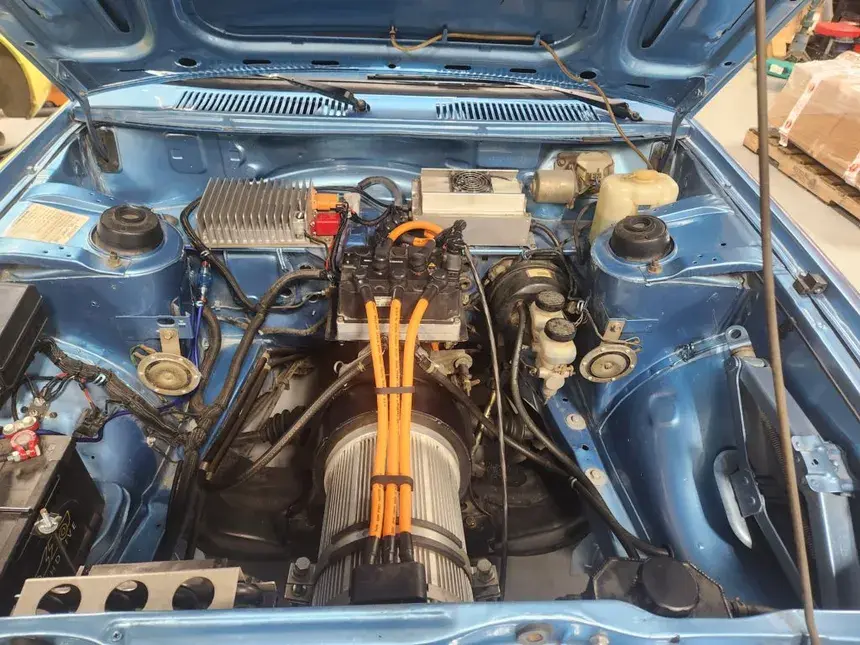Unless policies or technologies change, the ownership cost of electric vehicles (EVs) needs to decrease by 31 per cent if Canada to wants to reach its sales target of 60 per cent EVs by 2030, according to a new report released Thursday by Parliamentary Budget Officer Yves Giroux.
Last December, the federal government unveiled its Electric Vehicle Availability Standard that outlined zero-emission vehicle sales targets for automakers. The standard requires all new light-duty sales in Canada to be electric or plug-in hybrid by 2035. There are also interim targets of at least 20 per cent of all sales being EVs by 2026 and 60 per cent by 2030.
Those federal government targets come as growth forecasts for auto companies have plateaued and concerns about charging infrastructure persist. The price of EVs has also pushed the cars out of reach for many consumers. According to the Canadian Black Book, the average cost of an EV was $73,000 in 2023.
Maybe don’t put a 100% tarrif on affordable Chinese EVs then?
It’s really telling that Chinese EVs (like imported Teslas) were basically considered fine until the prospect of them being affordable to the middle class arose. That’s when we started hearing about labour abuses and fires that only happen with * cheap Chinese* batteries.
It’s not like Tesla has a stellar reputation for quality and reliability. They started powerwall as a way to offload bad/ prematurely failing batteries. Don’t get me wrong, powerwall is a good idea. But pretending like BYD is going to have terrible batteries and that’s why we need tariffs is bad.
China has labour and human rights abuses (eg genocide of Uyghers in Xinjiang [cultural genocide is still genocide]). Imo Canada is doing a better job of reconciling with its history/present of cultural genocide than China is. Canada’s TFW program probably results in lots of horrible abuses that we don’t hear about, but i think this program may be on its way out too. These issues don’t only apply to EVs though.
The only things that’re EV specific are lithium batteries and automotive manufacturing.
EV tariffs are protectionism: We want to protect domestic automotive (and para-automotive) manufacturing capabilities, and our investments in EVs/green tech.
I don’t think 100% tariffs can be justified on EVs alone.
Because they don’t care about their workers ? Do we really want cars made by Chinese slaves ? Like we do with our t-shirts ? Fuck no.
Most of them are super automated… Do you mean the robots that Nio uses?
👏 stop 👏 subsidizing 👏 oil
$18B last year in government support for petrocorps.
Sounds like Canada should put a 50% tax on gasoline powered vehicles.
I am waiting for the exponential increase in gas prices to start.
We have to pay for the carbon we’re releasing, it is a market externality, it’s going to cost us trillions of dollars. This is what government is for in a capitalist society.
Only if that tax subsidizes EVs.
I’d rather that tax subsidizes trains.
Good point, I like that better.
i would love for my next car to be an EV
It doesn’t need to have 1000km range, or edge to edge touch screens, or anything fancy
Give me something like a subaru impreza, with 300-400km range, and a sunroof.
Give me a Honda fit but electric and make my landlord give me the ability to charge it. Some fancy tech would be nice, but I drive a used economy vehicle for a reason
I think you nailed one of the biggest but least talked about factors in mass adoption. I’d love to get an EV, but the only used ones I could reasonably afford would require daily charging as I’d use well over half a charge per workday and I have nowhere to charge at home or work.
Me too. Like, I drive a shitty ice, but I’d consider a decent upgrade in vehicles, only for an Ev and only with somewhere to charge it. Like, that’s one of the major reasons my wife and I are thinking of switching to renting or buying a house at the end of our lease.
And people like us are necessary for adoption. We’re the “yeah but even they have one and like it” people
I’m still tempted to do a diy conversion to get specifically what I want and nothing else. I have to get my money’s worth out of my bike too though.
i saw someone who moded an olschool subaru brat into an EV. Said he put a… Leaf battery and motor in it. Was really cool to see!
(stock photo)

The bolt ev and euv is an amazing car I love it and it fits your criteria.
The Bolt was discontinued after the 2023 model. But hey you can buy a new EV Chevy Equinox now starting at $55k >_>
Good news they recently announced they are continuing with a 2025 bolt ev and a 2026 bolt euv.
https://www.motortrend.com/news/next-generation-chevrolet-bolt-coming-2025-mary-barra/ https://insideevs.com/reviews/721006/chevrolet-bolt-everything-we-know/
This is fantastic. I need a new car but wasn’t in as position to buy a Bolt when they were available. I can hang on for another year or so until the new EUV.
Well, I’m never buying a Tesla and the same government is determined to withhold choice from us.
Have we as a country ever met a climate target? In fairness to our politicians (not really), the O&G industry regulates them and not the other way around. Until that power relation changes, our targets are just greenwashing
AFAIK the only environmental goal that we met was the Montreal protocol and the elimination of chemicals harming the ozone layer.
As a result of the international agreement, the ozone hole in Antarctica is slowly recovering. Climate projections indicate that the ozone layer will return to 1980 levels between 2040 (across much of the world) and 2066 (over Antarctica). Due to its widespread adoption and implementation, it has been hailed as an example of successful international co-operation. Former UN Secretary-General Kofi Annan stated that “perhaps the single most successful international agreement to date has been the Montreal Protocol”.
I think we also did something about acid rain for a few decades now but I can’t find any specific agreement. All I know is that I’m in my 40ies and thus old enough to remember it was an issue when I was a kid, and that the US and Canada agreed to do something about it.
Some governments, including those in Europe and North America, have made efforts since the 1970s to reduce the release of sulfur dioxide and nitrogen oxide into the atmosphere through air pollution regulations. These efforts have had positive results due to the widespread research on acid rain starting in the 1960s and the publicized information on its harmful effects.
I don’t know what changed but apparently, we don’t really care about the rest now.
It doesn’t look like the governments want EVs to replace ICE vehicles as they are today. The density in cities is already limited by parking and road space, and the infrastructure needed to charge all these new EVs isn’t really being built.
Keeping EVs in the $60k+ range and the short life-cycle of these vehicles will ensure most people transition to public and active transport, leaving the roads to luxury consumers.
Tesla asked Canada to reduce tariffs on its EVs made in China, Reuters source says - https://www.cbc.ca/news/canada/tesla-canada-china-tariffs-1.7307635
Why not subsidize electric bike Jesus Christ. Why the fuck are we subsidizing the auto industry, they got us by the fucking balls already.
Pair this news with the 100% tariff on EV imports.
Closet fossil fuel subsidy in disguise.
American here. Does Canada have any domestic auto manufacturers?
Ford, Stellantis, GM, Honda, Toyota: source (click “Made in Canada”). Both countries assemble many cars where parts are made in the US/Canada/Mexico (see: NAFTA/CUSMA aka USMCA)
edit: also for context, auto manufacturing is a big political football here in Ontario, with politicians always announcing funding and looking for photo ops around it because they’re big employers in manufacturing
Ford, GM, Toyota, Honda, Fiat Chrysler have factories in Canada. I don’t know of any that truly Canadian companies though.
For now, they can barely keep them running in the GTA.
If by that you mean “headquartered in Canada and manufacturing in Canada for the Canadian market” then the answer is no, I’m pretty sure the last ones vanished no later than the middle of the 20th century. Some US and other foreign companies do have manufacturing and assembly plants here, but I wouldn’t call them Canadian. (Ford Canada used to be semi-independent and produced some own-model vehicles early on, but they’re nothing more than a subsidiary of the US company now.)






